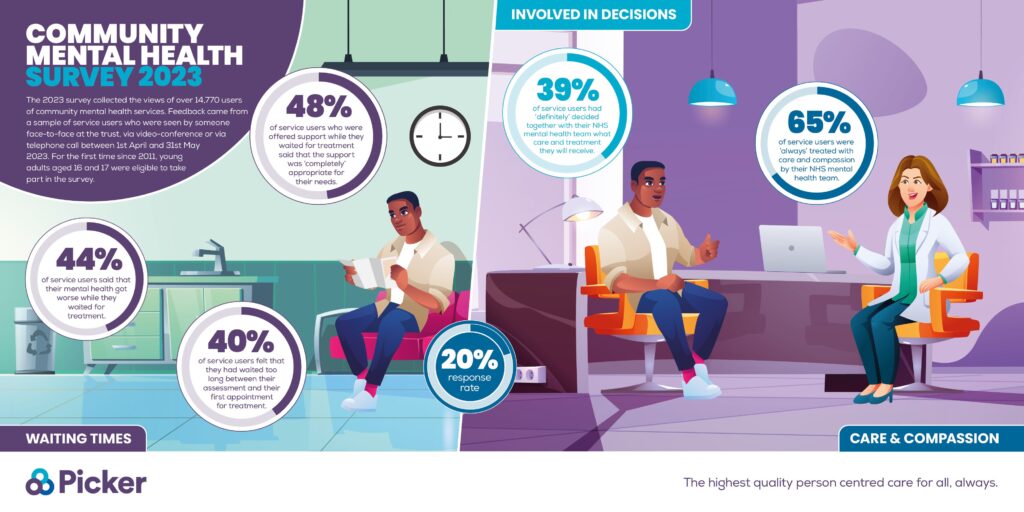Lincolnshire Partnership NHS Foundation Trust’s cultural journey
Lincolnshire Partnership Foundation Trust (LPFT) is a mental health and learning disability trust serving a local population of over 756,000 people in the East Midlands. It has been on a five-year journey from requires improvement in 2015 to “good” overall and “outstanding” for well-led in 2020. The organisation started its improvement journey with the introduction of NHSEI’s Culture and Leadership Programme. Since then, there has been what the Care Quality Commission (CQC) described as “a continued and impressive cultural shift… that enabled and empowered staff and patients to be heard”.
Challenges
In 2015 when LPFT started their improvement journey they faced significant challenges:
- Poor staff morale was highlighted in their NHS Staff Survey, cultural barometer and pulse survey results.
- Ageing workforce – over the following 1-3 years a significant proportion of staff were due to retire.
- CQC rated “requires improvement”.
- Staff felt the trust was overly focused on finance to the detriment of quality.
- The workforce wasn’t representative of the population they served.
- Staff felt that existing talent wasn’t nurtured/valued.
Actions
The trust’s cultural programme aimed to create an organisation that had patient and staff at the heart of its decision making. Therefore, the starting point was the co-production of a new vision and set of values and behaviours. This is now fully embedded across the trust and underpins its strategic ambitions.
Our vision is to support people to live well in their communities.
The new vision is reinforced by a culture and ethos of Continuous Quality Improvement (CQI). To help with ideas for improvement LPTF staff visited other trusts to learn what they were doing well.
The trust reviewed their people strategy and redesigned it to focus on four key areas:
1. Recruitment and retention
- Inclusivity – making sure the workforce is representative of the population it serves.
- Recruiting using value-based recruitment – reviewed onboarding experience.
- Developing people – today’s skill needs and skills required for integrated systems.
- How to retain people – why do people leave? Introduced stay conversations and exit interviews.
2. Staff wellbeing
- Involving people in any organisational change.
- Staff recognition – LPFT Heroes, annual staff awards, thank you cards.
- Expanded comms channels and networks – staff Facebook, team brief, new intranet, regular polls/surveys, LGBTQ+ group.
- Team effectiveness program – coproduced a range of initiatives to help the teamwork better together.
3. Reducing processes and learning lessons
- Clinical training skills and development opportunities.
- Admin burden – eg clinical system not fit for purpose.
- Improving the working environment.
- Mental health services – reviewed access to provision.
4. Culture and Leadership
Hidden Treasures programme – ensures that every member of staff feels valued and appreciated for their contribution and can fulfil their potential, whatever that may look like or mean to them.
These initiatives became part of a Lessons Learned Culture, where the trust used experience data to continuously improve for both staff and service users.
To help to mobilise people and take them on the journey, the trust encouraged everyone to add their views and clearly communicated what it was trying to achieve. This ensured a bottom-up approach that empowered all stakeholders to be involved. All changes had a project plan in place to support them and each milestone, however small, was celebrated.
Impact
This co-produced and targeted approached has resulted in an engaged and motivated workforce, who are better prepared to support the population they serve.
They’ve cultivated a collective and compassionate leadership culture and are now rated “outstanding” for “well-led” and “good” overall.
The achievements of the new strategy show in their NHS staff survey data:
- Staff were often/always enthusiastic about their job: 2015 – 71%, 2021 – 81%
- Staff felt senior management would act on staff feedback: 2015 – 23%, 2021 – 43%
- Staff would recommend the organisation as a place to work: 2015 – 48%, 2021 – 74%
- Staff felt the care of service users was the organisation’s top priority: 2015 – 60%, 2021 – 82%
Going forward
The trust needs to help with the assessments and adaptations for working from home, which has driven an increase in muscular-skeletal conditions. There has also been an impact on team effectiveness, so getting cohesion back into remote working is a new challenge.
Staff are reporting high levels of stress which has been exacerbated by the pandemic. The trust needs to understand how they can help staff with this and put support plans in place.
Listening to our staff and acting on their feedback is extremely important to us at LPFT; which is why we have developed an annual staff engagement cycle that starts with promoting the national staff survey, analysing all the results and theming the statements that people take the time and trouble to write; going out on roadshows to share back the data and learn more, then making the necessary adjustments and listening back in on a quarterly basis with our cultural barometer. It is hoped that by working in this way on an annual cycle, we can continue to listen to what’s important to our staff, and they can feel valued and that their voice really does make a difference.
Jane McLean – Associate Director of People (OD, Leadership and Culture), LPFT.
LPFT has continued to improve its staff experience. Catch up on their latest work here.

